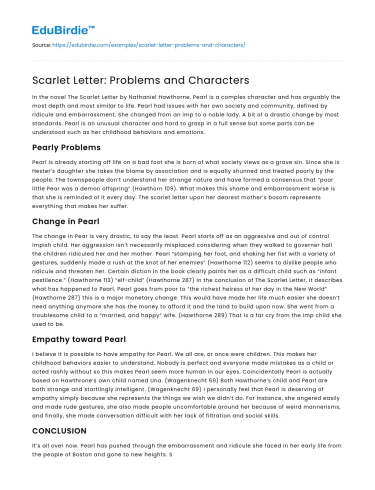In the novel The Scarlet Letter by Nathaniel Hawthorne, Pearl is a complex character and has arguably the most depth and most similar to life. Pearl had issues with her own society and community, defined by ridicule and embarrassment. She changed from an imp to a noble lady. A bit of a drastic change by most standards. Pearl is an unusual character and hard to grasp in a full sense but some parts can be understood such as her childhood behaviors and emotions.
Pearly Problems
Pearl is already starting off life on a bad foot she is born of what society views as a grave sin. Since she is Hester’s daughter she takes the blame by association and is equally shunned and treated poorly by the people. The townspeople don’t understand her strange nature and have formed a consensus that “poor little Pear was a demon offspring” (Hawthorn 109). What makes this shame and embarrassment worse is that she is reminded of it every day. The scarlet letter upon her dearest mother’s bosom represents everything that makes her suffer.
Change in Pearl
The change in Pear is very drastic, to say the least. Pearl starts off as an aggressive and out of control impish child. Her aggression isn’t necessarily misplaced considering when they walked to governer hall the children ridiculed her and her mother. Pearl “stamping her foot, and shaking her fist with a variety of gestures, suddenly made a rush at the knot of her enemies” (Hawthorne 112) seems to dislike people who ridicule and threaten her. Certain diction in the book clearly paints her as a difficult child such as “infant pestilence.” (Hawthorne 113) “elf-child” (Hawthorne 287) In the conclusion of The Scarlet Letter, it describes what has happened to Pearl. Pearl goes from poor to “the richest heiress of her day in the New World” (Hawthorne 287) this is a major monetary change. This would have made her life much easier she doesn’t need anything anymore she has the money to afford it and the land to build upon now. She went from a troublesome child to a “married, and happy” wife. (Hawthorne 289) That is a far cry from the imp child she used to be.
Empathy toward Pearl
I believe it is possible to have empathy for Pearl. We all are, or once were children. This makes her childhood behaviors easier to understand. Nobody is perfect and everyone made mistakes as a child or acted rashly without so this makes Pearl seem more human in our eyes. Coincidentally Pearl is actually based on Hawthrone’s own child named Una. (Wagenknecht 69) Both Hawthorne’s child and Pearl are both strange and startlingly intelligent. (Wagenknecht 69) I personally feel that Pearl is deserving of empathy simply because she represents the things we wish we didn’t do. For instance, she angered easily and made rude gestures, she also made people uncomfortable around her because of weird mannerisms, and finally, she made conversation difficult with her lack of filtration and social skills.
CONCLUSION
It’s all over now. Pearl has pushed through the embarrassment and ridicule she faced in her early life from the people of Boston and gone to new heights. She has grown more drastically than any other character so far, maybe due to the fact that she is based on Hawthorne’s own daughter Una. Pearl has changed from an aggressive, impish, and difficult child into something new. No longer does she scream at her tormentors or throw rocks at them, now she nurtures her own young one. Not only that but she is now a noble, full of wealth and happiness. She deserves empathy for her mistakes and behaviors. She deserves it all because she has grown and made a way for herself in the New World.
Works Cited
- Hawthorne, Nathaniel. EVERBIND ANTHOLOGIES. Marco Book Company, 2001.
- Wagenknecht, Edward. Characters in The Scarlet Letter. Continuum Publishing Company, 1989.






 Stuck on your essay?
Stuck on your essay?

